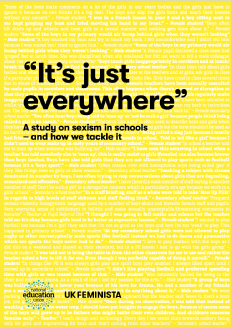IER News & blogs
New report on sexism in schools launched
 IER’s Gaby Atfield, Erika Kispeter and Clare Lyonette have been commissioned by the National Education Union (NEU) and UK Feminista to conduct research on sexism in UK schools.
IER’s Gaby Atfield, Erika Kispeter and Clare Lyonette have been commissioned by the National Education Union (NEU) and UK Feminista to conduct research on sexism in UK schools.
The report summarising the findings will be launched today (12 December 2017) at the Houses of Parliament.
Key findings from the research include:
- Over a third (37%) of girls at mixed-sex schools have been sexually harassed while at school.
- Over a third (34%) of primary school teachers say they witness gender stereotyping in their schools on at least a weekly basis.
- 64% of teachers in mixed-sex secondary schools hear sexist language in schools on at least a weekly basis.
- Students generally do not report sexism: only 14% of those who experienced sexual harassment told a teacher and 6% who heard the use of sexist language reported it.
UK Feminista and the NEU call on the Government, Ofsted and schools to take urgent action to challenge sexism and sexual harassment in schools. The report is based on a survey of 1508 secondary school students and 1634 teachers at secondary and primary schools in England and Wales. Discussion groups were also conducted with secondary school students.
New school for the old school: careers guidance and counselling - Blog from Dr. Deirdre Hughes OBE
 These are critical times for career guidance and counselling in education. The implementation of up-to-date guidance and counselling in education must not be seen as something separated from educational reform. There is a critical tension between progressive and regressive tendencies in both education and careers work. The case for reform requires careful attention leading to innovative solutions.
These are critical times for career guidance and counselling in education. The implementation of up-to-date guidance and counselling in education must not be seen as something separated from educational reform. There is a critical tension between progressive and regressive tendencies in both education and careers work. The case for reform requires careful attention leading to innovative solutions.
IER Business Class Evaluation report published
On 26 November, Business in the Community published its report Destiny should not be determined by demography which considers the impact of school-business partnerships on young people’s employability, as well as the effects of such partnerships on schools and businesses. The report is based on research carried out by Terence Hogarth and Lynn Gambin at the Institute for Employment Research which aimed to assess the impact of employer-engagement activities, the uplift of employability skills and added-value impact on pupils of the Business Class programme. This research was carried out over the past two years in conjunction with Education and Employers Research.
The full evaluation report can be downloaded from http://www.bitc.org.uk/programmes/business-class/business-class-evaluation.
